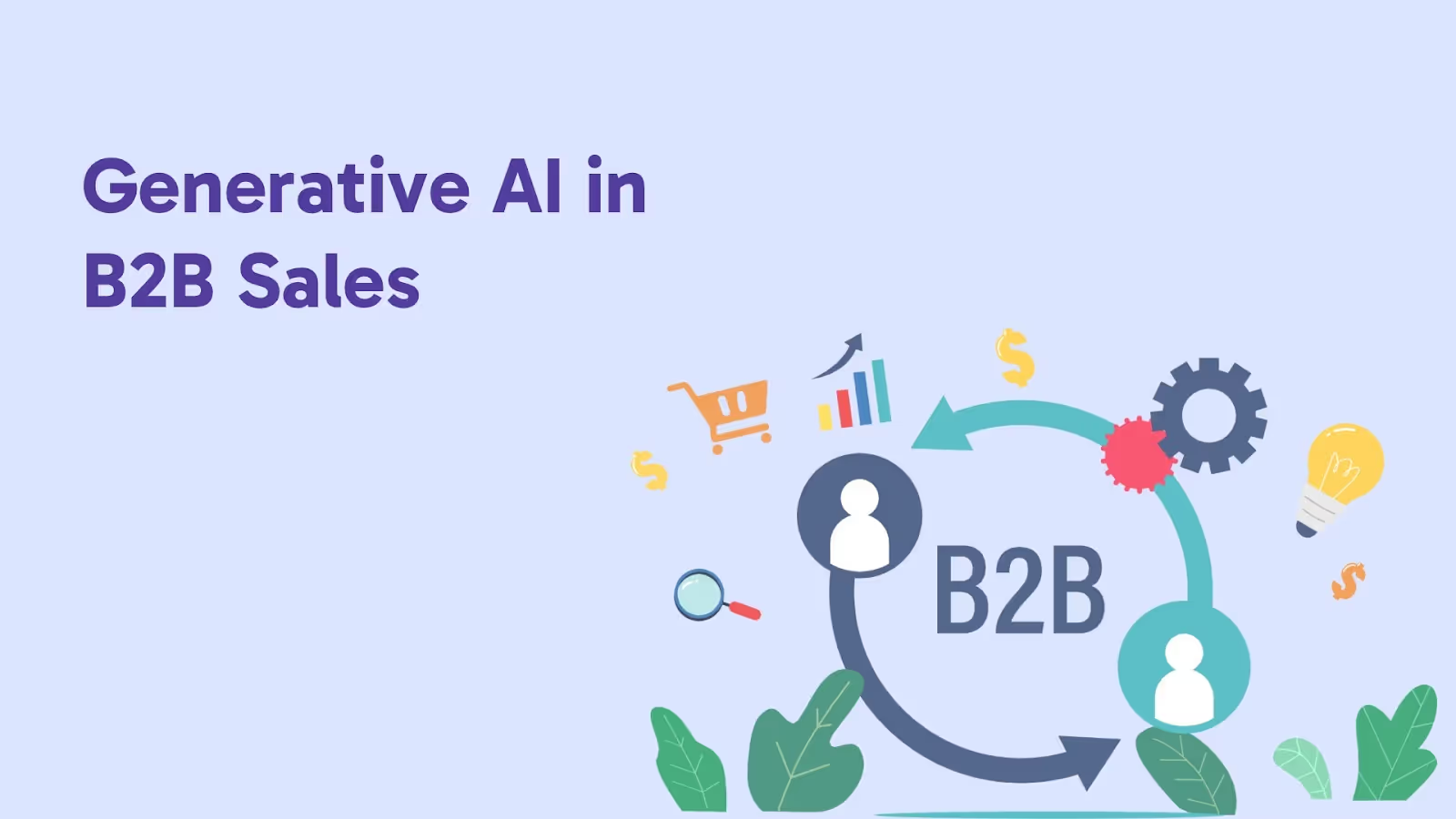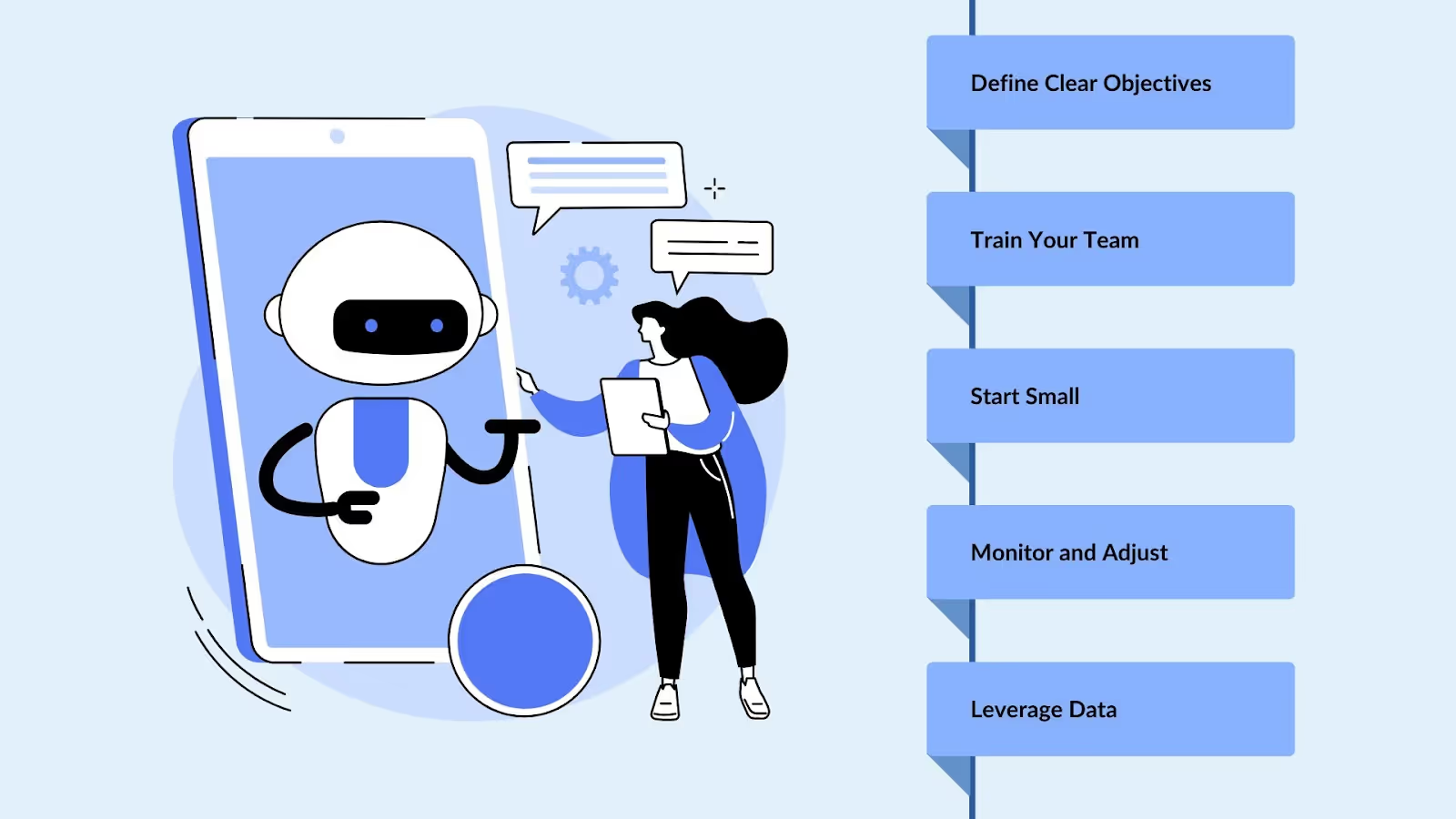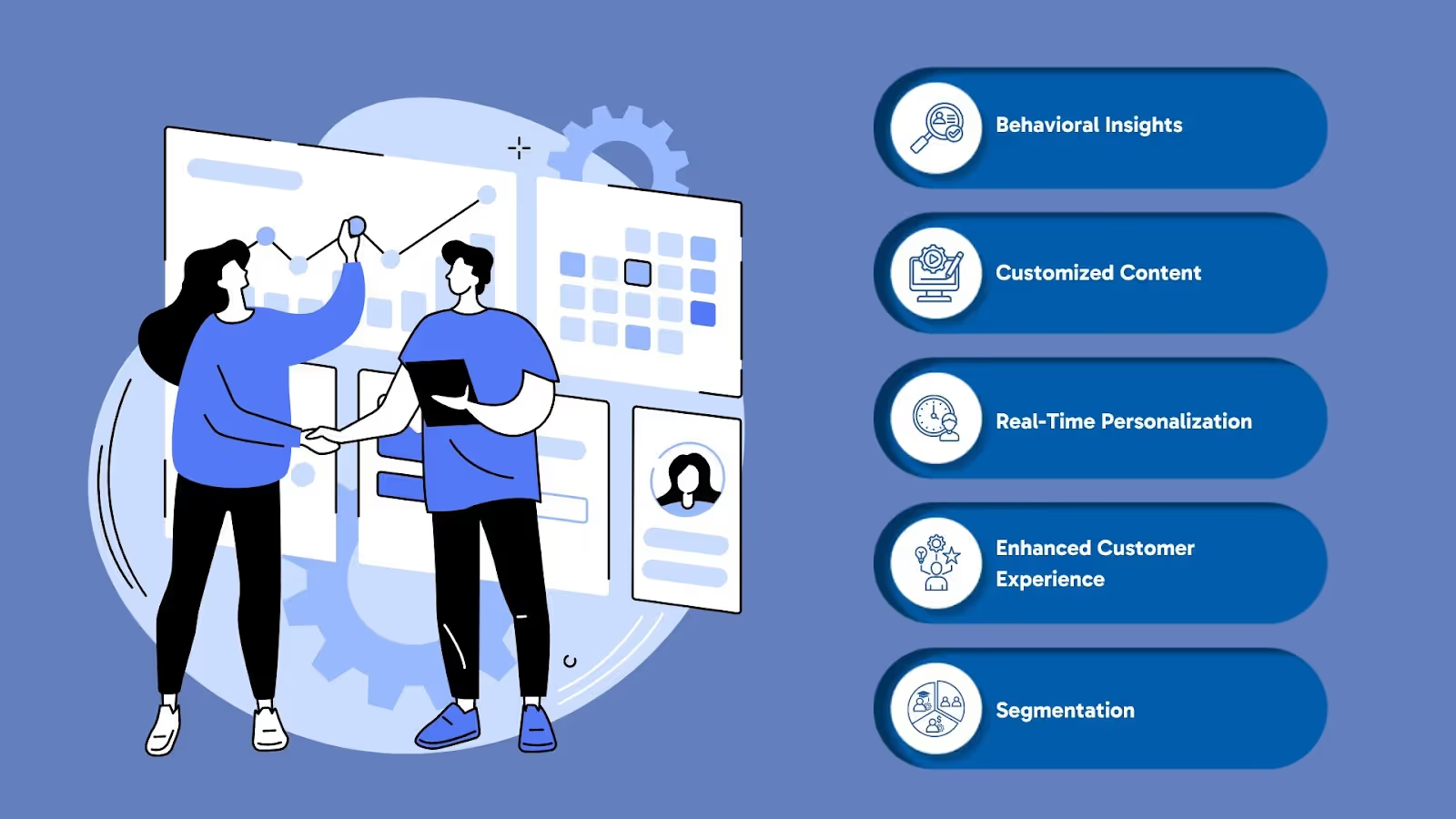Using Generative AI in B2B Sales: A Guide for 2024


Don’t miss what’s next in AI.
Subscribe for product updates, experiments, & success stories from the Nurix team.
Imagine this: your B2B sales process, is supercharged by an intelligent assistant that learns and adapts, and predicts your next best move. This isn’t science fiction; it’s reality with generative AI in B2B sales. As 2024 unfolds, understanding how to use AI in B2B sales will transform your approach and boost efficiency, precision, and impact.
How Generative AI Transforms B2B Sales
Generative AI can handle mundane, repetitive tasks so your sales team can focus on what they do best: close deals. Tasks like data entry, follow-up emails, and scheduling can be handled by AI so your team can focus on strategic activities
Key Points:
- Automated Data Entry: AI-powered tools can handle data entry accurately, reducing human errors and saving time. For example, Tools like UiPath and Blue Prism can be configured to automate data entry tasks, which can include integration with various CRM systems.
- Email Follow-ups: AI can schedule and send personalized follow-up emails based on customer behavior and interaction history, timely and relevant communication. For example, tools like Salesforce Einstein and HubSpot’s AI features provide capabilities for email follow-ups based on customer behavior and interaction history.
- Efficient Scheduling: AI tools like Clara and x.ai can manage meeting schedules, avoid conflicts, and optimize time management by learning preferences and patterns.
- Lead Scoring: AI algorithms can analyze vast amounts of customer data to score leads based on their likelihood to convert, so sales teams can focus on high-potential prospects.
- Customer Insights: AI can provide deep insights into customer preferences and behaviors by analyzing interaction data, so sales can tailor their pitches and strategies.
- Personalized Sales Pitches: AI tools can generate personalized sales pitches and presentations by analyzing the interests and needs of potential clients, and higher engagement rates.
- Sales Forecasting: AI can analyze historical sales data to predict future sales trends, so businesses can plan and allocate resources better.
- Competitor Analysis: AI tools can monitor competitors’ activities and market trends, and insights to adjust strategies to stay ahead in the market.
- Automated Reporting: AI can generate sales reports and performance analytics, real-time insights to make informed decisions.
Transitioning from understanding the transformative power of AI, let's explore the strategies to effectively implement these technologies into your sales processes.
Effective Strategies for Implementing Generative AI

Implementing generative AI requires a strategic approach to ensure it integrates seamlessly into your sales process. The following strategies can help in leveraging AI effectively in B2B sales and demonstrate how to use AI in B2B sales efficiently.
Key Points:
- Define Clear Objectives: What do you want to achieve with AI implementation, like more leads or better customer engagement? Clear goals guide the integration and measure success.
- Train Your Team: Make sure your sales team knows how to use the AI tools and integrate them into their workflow. Comprehensive training programs and continuous learning opportunities are key to maximizing AI benefits.
- Start Small: Start with a pilot to test AI before a full rollout. Starting small helps to manage risk and make adjustments.
- Monitor and Adjust: Continuously monitor AI performance and make adjustments to improve outcomes. Feedback loops and performance metrics are critical to refine AI.
- Leverage Data: Use AI to analyze customer data and refine your sales approach based on insights. AI can give you deep insights into customer behavior and preferences, so you can tailor your approach.
Having outlined the strategies for effective AI implementation, it's essential to familiarize yourself with the key tools that can support these initiatives.
Key Generative AI Tools for B2B Sales
Here are some prominent generative AI tools that can enhance your B2B sales efforts:
- OpenAI ChatGPT-4: OpenAI’s ChatGPT-4 is an advanced language model that can generate human-like text for content creation, customer support, and interactive chatbots. It often understands context well, making it useful for personalized content and customer interactions.
Key Features:
- Natural Language Understanding and Generation: Generates coherent, contextually accurate responses for conversational use.
- Context-Aware Responses: Keeps context over long conversations to improve user experience.
- Versatile Applications: For content creation, automated customer support, and as a virtual assistant.
- DALL-E: OpenAI’s DALL-E generates images from text, allowing businesses to create custom visuals based on their requirements, though results may vary. It can be a useful tool for marketing and creative teams.
Key Features:
- Text-to-Image Generation: Turns detailed text descriptions into high-quality images, giving you creative freedom.
- Custom Visuals: Creates unique images to your specifications, perfect for marketing campaigns.
- Creative Flexibility: Can generate many different visual styles, from realistic to abstract.
- Jasper: Jasper is for generating marketing content, blog posts, social media updates, and ad copy. Helps businesses maintain a consistent brand voice and produce content fast.
Key Features:
- Content Generation: Produces blog posts, social media content, and ad copy.
- Customizable Tone and Style: Adapts writing style to your brand voice and target audience.
- Efficiency: Reduces time to produce high-quality content, and increases productivity.
- Copy.ai: Copy.ai is for marketing copy, product descriptions, emails, and social media content. Uses AI to generate persuasive copy for specific audience segments.
Key Features:
- Marketing Copy Creation: Generates product descriptions, email content, and social media posts.
- Audience Tailoring: Customizes copy to resonate with different target audiences.
- Persuasive Writing: Uses AI to write compelling marketing copies and strategies.
- RunwayML: RunwayML is a suite of tools for artists and creators to generate, edit, and explore new visual content with machine learning. Works on many creative projects so great for generating new visual content.
Key Features:
- Creative Tools: Range of tools to generate and edit images and videos.
- User-Friendly Interface: Accessible for artists and creators with no deep technical knowledge.
- Machine Learning Models: Uses advanced ML models to create unique and imaginative content.
With these tools in hand, ensuring successful AI integration into your sales processes becomes the next critical step.
Ensuring Successful AI Integration
For AI to work, you need a structured approach that aligns with your business and processes. Planning, training, and continuous improvement to get the most out of AI. Here’s how to use AI in B2B sales.
Key Points:
- Align with Business Goals: Make sure AI initiatives support overall business goals. This ensures AI tools are contributing to broader business outcomes.
- Comprehensive Training: Give full training to employees on how to use AI tools. This should cover the features of AI tools and how to use them in daily tasks.
- Continuous Improvement: Update and refine AI applications based on performance feedback. Continuous improvement helps to optimize AI tools and processes.
- Integration with Existing Systems: Integrate AI tools with your current CRM and other sales systems. Integration means a smooth workflow and better data.
- Scalability: Choose AI solutions that scale with your business growth. Scalability means AI tools will work as your business grows.
Moving forward, it’s important to be aware of and prepared for the challenges that can arise when using generative AI.
Overcoming Challenges in Using Generative AI
While generative AI has many benefits, it also has challenges like data privacy and maintaining the human touch in sales interactions. Addressing these challenges is key to successful AI adoption and knowing how to use AI in B2B sales.
Key Points:
- Data Privacy: Ensure you comply with data protection regulations when using AI. Implement robust data security and stay up to date with the regulations.
- Maintaining Human Interaction: Balance AI automation with human touch to preserve customer relationships. AI should enhance human efforts not replace them.
- Managing AI Bias: Implement measures to identify and mitigate any biases in AI algorithms. Regular audits and diverse training data can help reduce bias.
- Cost Considerations: Evaluate the cost of AI solutions before you implement them. Consider short-term and long-term costs to get a positive ROI.
- Ethical Use of AI: Follow ethical guidelines when deploying AI to build trust with customers. Transparency and accountability are key to ethical AI.
Once these challenges are addressed, leveraging AI to personalize sales interactions can greatly enhance customer satisfaction and loyalty.
Personalizing Sales Interactions with Generative AI

AI has the potential to allow for highly personalized interactions with prospects and customers, enhancing engagement and satisfaction. Personalization at scale can lead to better conversion rates and customer loyalty, showing another way on how to use AI in B2B sales.
Key Points:
- Behavioral Insights: Use AI to analyze customer behavior and preferences for personalized interactions. AI tools can track and predict customer actions so you can create personalized experiences.
- Customized Content: Generate content for each prospect based on their unique needs. Personalization can be emails, offers, and product recommendations.
- Real-Time Personalization: Adjust in real time based on customer feedback and data. Real-time personalization means communication stays relevant and timely.
- Enhanced Customer Experience: Provide a seamless personalized customer journey with AI-powered insights. AI can help you identify pain points and improve the overall experience.
- Segmentation: Create precise audience segments for marketing and sales efforts. Segmentation means more targeted and higher conversion rates.
As personalization becomes more integral to your strategy, leveraging AI analytics tools will provide deeper insights and more refined approaches.
Leveraging AI Analytics Tools
AI analytics tools can analyze and interpret massive amounts of data to give you valuable insights to drive B2B sales decisions. Learning how to use AI in B2B sales analytics is key to getting ahead.
Key Points:
- Data Visualization: Use AI tools to create data visualizations for easier interpretation. Tools like Tableau and Power BI can help you create insightful visualizations.
- Predictive Analytics: Forecast sales and customer behavior with advanced analytics. Predictive analytics will guide your planning and decision-making.
- Performance Metrics: Track and analyze key performance indicators (KPIs) with AI insights. AI tools will give you real-time metrics to measure performance.
- Customer Insights: Get a deeper understanding of customer needs and preferences with AI analysis. Customer insights will help you develop better sales strategies.
- Optimized Strategies: Refine sales and marketing strategies based on data-driven insights. Continuous optimization means your strategies stay relevant and effective.
Finally, to sustain AI’s benefits, developing long-term strategies is key as the technology continues to evolve.
Looking Ahead: Long-Term AI Implementation Strategies
As generative AI continues to evolve, we need to plan for long-term benefits in B2B sales. This means staying up to date with the technology and adapting to changes.
Key Points:
- Future-Proofing: Invest in AI that can adapt to future changes and advancements. Future-proofing means your AI investments will remain valuable over time.
- Continuous Learning: Get your team to keep learning and developing so you can stay ahead of the curve with AI. Continuous learning means you can keep up with AI advancements.
- Scalable Solutions: Ensure your AI solutions can grow with your business. Scalability is key to staying effective as the business grows.
- Innovation: Stay up to date with the latest AI trends and adopt new solutions. Innovation means you can stay competitive and leverage new opportunities.
- Strategic Partnerships: Partner with AI technology providers for long-term growth and support. Partnerships give you access to new technology and expertise.
Conclusion
Generative AI in your B2B sales strategy can transform your business, making it more efficient, personal, and data-driven. As you move forward, balance the power of AI with the unique value of human interaction. By including how to use AI in B2B sales in your strategy you can stay ahead of the curve and get amazing results.
Ready to transform your sales approach? Embrace the power of AI today and watch your sales soar.
Discover how Nurix AI can elevate your B2B sales strategy and drive unparalleled success. Visit Nurix AI now!

Don’t miss what’s next in AI.
Subscribe for product updates, experiments, & success stories from the Nurix team.









